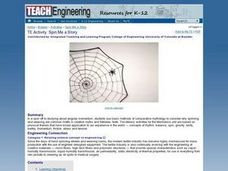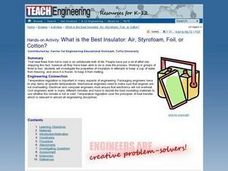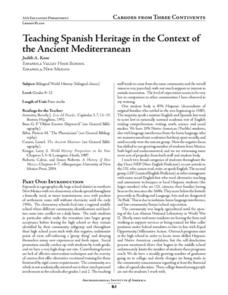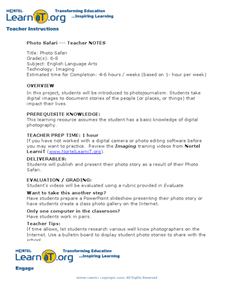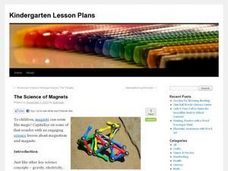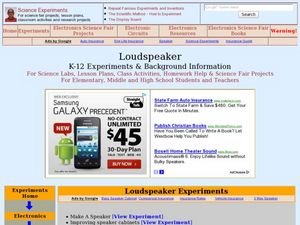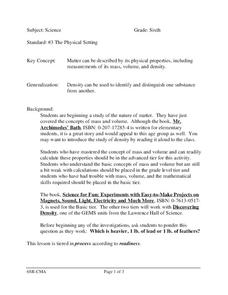Curated OER
Steamship Portland: Where's the Energy?
Learners examine how steamships operate. They describe the necessary energy conversions. They construct a model paddlewheel ship. They use rubber bands as examples of potential and kinetic energy as they unwind and set the models in motion.
Curated OER
Spin Me a Story
Students examine the motif of spinning and weaving in myths and folktales. They read various myths, complete a WebQuest, develop a mind map of story elements, and write an original "spider" story.
Curated OER
What is the Best Insulator: Air, Styrofoam, Foil, or Cotton?
Students investigate the properties of insulators by attempting to keep a cup of water from freezing, and once it is frozen, to keep it from melting. They conduct the experiment, record and analyze the results, and answer discussion...
Curated OER
The Introduction and Diffusion of Household Technology
Learners conduct research and develop a matrix demonstrating the introduction and spread of common household items from 1900 to 2000 in the U.S. They conduct Internet research, watch and discuss a video, and develop the matrix.
Curated OER
Junkyard Wars-Investigating More Electromagnets
Fourth graders conduct an investigation in order to determine a way to change the strength of an electromagnet's magnetic force. After conducting "control" lifts with their electromagnet, groups make initial changes, record data, and...
Curated OER
Avoiding Carbon Dioxide Emissions from Burning Fossil Fuels
Students calculate stoichiometrically the amount of carbon dioxide that would be emitted from burning a mole of varios alkanes that comprise fossile fuels. If the energy released from burning a mole of these alkanes is known, then the...
Curated OER
The Virtual Electron Microscope
Students explore the world of the very small using a Flash plug-in Virtual Electron Microscope. They complete and discuss an activity in which unknown samples are placed under the computer simulated microscope to determine where the...
Curated OER
Teaching Spanish Heritage in the Context of the Ancient Mediterranean
Learners identify and interpret Spanish heritage, including the Mediterranean culture, language, history, trade, and migration. Following, they began an in-depth study of Egypt, the Middle East, Greece, and Rome and were able to make...
Curated OER
Photo Safari
Students take photographs of people and things that impact their lives. In this photojournalism lesson plan, students learn how to use a photo to tell a story and present their project.
Curated OER
Introduction to the Periodic Table
Eighth graders investigate the different elements of the Periodic Table. For this chemistry lesson, 8th graders pick an element to research, then present to the class using a powerpoint presentation or a poster.
Curated OER
What's a Resistor?
Students determine what a resistor does as they construct parallel circuits. In this circuitry lesson, students experiment with batteries, alligator clips, a resistor and a three-way switch to find out what a resistor does. They continue...
Curated OER
The Science of Magnets
Students are introduced to the concept of magnetism and investigate the properties of magnets. For this magnetism lesson, students identify a magnet then examine why certain things are attracted to magnets and some things are repelled by...
Curated OER
Build Your Own Submarine
Students construct their own submarine following a certain procedure. For this physics lesson, students calculate the density of objects using a mathematical formula. They explain why some object floats in water while some do not.
Curated OER
Half Lives
Students investigate the concept of half-life by conducting an M&M experiment. In this chemistry lesson, students differentiate nuclear fusion and fission. They present investigation findings to class.
Curated OER
Jean Hasbrouck House
Students research lifestyles from the 18th century. They examine artifacts from the Jean Hasbrouck House and associate them with the responsibilities and roles of the people who lived there. They make candles and consider the importance...
Curated OER
Lesson 5: Designing an Experiment
The intent of this lesson is to introduce young scientists to the steps of the scientific method. To this end, they consider the question, "Which brand of battery lasts longest?" In this case, the experiment is carried out as a class,...
Curated OER
Learning Library Skills during Technology Transitions
Making the transition to a higher-tech school library or computer lab? This plan suggests 5th graders undertake a scavenger hunt and make a PowerPoint to educate younger schoolmates about how to use information resources in an...
Curated OER
Food Webs
Fourth graders discover how organisms depend upon each other in an ecosystem. In this ecosystems lesson plan, 4th graders use food webs to discuss the interdependence between organisms in an ecosystem.
Curated OER
Loudspeaker
Students study the different types of loudspeakers and how they work. In this sound activity students create their own loudspeakers.
Curated OER
What is pH and Why is it Important?
Students investigate acids, bases, and pH, and related this knowledge to the problem of acid deposition.
Curated OER
Power Blackout Assessment
Learners discuss the importance of power grids in power generation. In this physics lesson, students explain the impact of power failure. They investigate the power blackout in 2003 and discuss their findings.
Curated OER
Examining a Microchip
In this computer technology lesson students investigate silicon microchips. Students explore microchip technology using a microscope. Lesson contains hands on investigations.
Curated OER
Physical properties of matter
Sixth graders find the physical properties of matter. In this matter lesson, 6th graders measure mass, volume, and density. Students are broken into 3 tiers with 3 different activities based on their understanding of mass and volume.
Curated OER
Metals, Non-Metals, Metalloids
Learners describe properties of various elements. They arrange the elements based on properties in order to explain the organization of the periodic table. They label elements as metal, non-metal, or metalloid.
Other popular searches
- Basic Electricity Worksheets
- Basic Electricity Free
- Basic Electricity Buzzer
- Basic Electricity Circuits
- Basic Electricity and Circuits
- Basic Electricity + Free
- Basic Electricity \ Free



